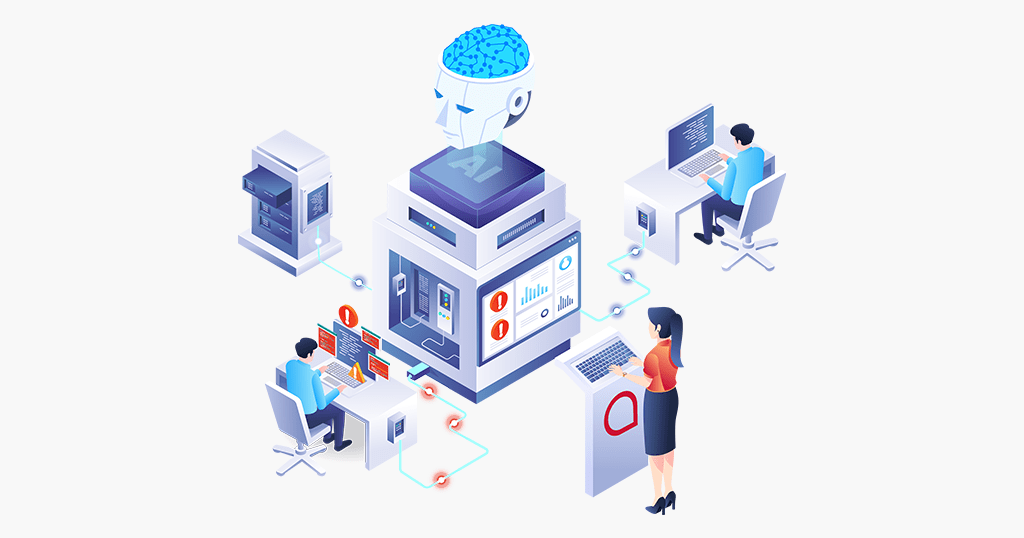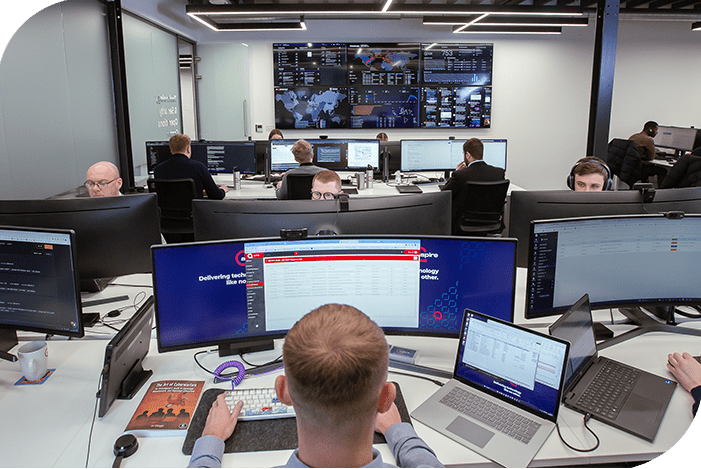
What is SIEM and
how does it work?
What is SIEM?
SIEM, or Security Information and Event Management, is a comprehensive cybersecurity solution that allows organisations to monitor, detect, and respond to potential security threats in real-time.
By combining various security technologies and processes, SIEM systems aim to provide a holistic overview of an organisation’s security posture, helping to safeguard critical data and infrastructure from cyberattacks.
In essence, SIEM functions as the central nervous system of an organisation’s cybersecurity framework. It collects and analyses data from multiple sources, including network devices, servers, applications, and other security tools. To understand SIEM better, let’s break down its two primary components:
- Security Information Management (SIM): This element focuses on the collection, storage, and analysis of log data generated by various devices and systems within an organisation.
- Security Event Management (SEM): This component is responsible for real-time monitoring, event correlation, and notification of potential security threats.

How does SIEM work?
The SIEM system works by integrating the functions of both SIM and SEM.
Through the SIM component, it collects and analyses log data from various sources, helping to identify security incidents by monitoring and correlating the data.
Meanwhile, the SEM component analyses and interprets the data collected by SIM to pinpoint suspicious activities and trigger alerts for immediate action.
Together, these components enable SIEM systems to provide a comprehensive view of an organisation’s security landscape. They help identify vulnerabilities, detect potential threats, and initiate swift responses to mitigate risks.
By continuously monitoring and analysing data, SIEM systems can detect even subtle signs of malicious activity, empowering organisations to stay one step ahead of cybercriminals.

Discover our marketing-leading SIEM service
The importance of having a security team to deal with alerts
While SIEM systems play a crucial role in detecting potential security threats and vulnerabilities, it’s essential to have a dedicated security team in place to respond effectively to these alerts.
Cybersecurity is a dynamic and complex field, and having a team of skilled professionals working alongside the SIEM solution ensures that your organisation can address security incidents in a timely and efficient manner. Here’s why a security team is indispensable when it comes to SIEM:

Swift Response to Security Incidents
When a SIEM system detects suspicious activity or a potential breach, time is of the essence. A dedicated security team can quickly assess the situation, determine the severity of the threat, and implement necessary countermeasures to contain and mitigate the incident. This swift response can be the difference between a minor inconvenience and a full-blown security disaster.
Expert Analysis and Decision Making
A well-trained security team brings expertise and experience to the table, allowing them to interpret SIEM alerts accurately and make informed decisions. They can differentiate between false positives and genuine threats, ensuring that the organisation focuses its resources on addressing genuine risks rather than chasing down false alarms.
Ongoing Maintenance and Improvement
An effective security team doesn’t just respond to incidents; they also work proactively to improve the organisation’s overall security posture. By regularly reviewing and refining the SIEM system’s configurations and rules, the security team can ensure that the system remains up-to-date and effective in the face of evolving cyber threats.
Employee Training and Awareness
One of the most significant cybersecurity risks comes from within the organisation—human error. A dedicated security team can help educate employees on best practices and raise awareness about potential security risks. This training can dramatically reduce the likelihood of successful phishing attacks or other social engineering techniques that exploit human vulnerabilities.
What makes a good SIEM?
When evaluating a SIEM solution for your organisation, keep these essential features in mind to ensure you choose an effective and user-friendly option:
- Wide Log Collection: A good SIEM should gather logs from various sources to offer a comprehensive view of your organisation’s security landscape.
- Scalability: As your organisation grows, your SIEM must be able to handle increasing amounts of data while maintaining efficient performance.
- Real-time Alerts: Quick detection and alerts are crucial for timely response to potential threats, minimising potential damage.
- Smart Analytics: Advanced analytics help identify patterns and anomalies, prioritising genuine threats and minimising false positives.
- Customisability: A good SIEM should be flexible, allowing you to create tailored rules and policies based on your organisation’s specific needs.
- User-friendly Interface: An intuitive interface makes managing the system easier, while comprehensive reporting provides valuable insights into your security status.
- Incident Response Automation: Streamlining workflows and automating responses help your security team react swiftly to potential threats.
- Compliance Support: A good SIEM should offer features that help organisations meet regulatory requirements and maintain compliance.
- Vendor Support: Reputable vendors provide robust support, training resources, and updates, ensuring your SIEM remains effective in the long run.
By keeping these key characteristics in mind, you’ll be better equipped to select a SIEM solution that offers comprehensive protection without overwhelming your organisation or its users.
What are the main benefits of SIEM?
In today’s rapidly evolving digital landscape, organisations of all sizes must take proactive measures to safeguard their IT infrastructure from potential security risks.
SIEM solutions have emerged as a vital component in enhancing security workflows, providing a wide range of benefits that help businesses protect their valuable assets. The benefits of SIEM include:
Comprehensive Threat Detection
SIEM systems offer a holistic view of your organisation's security environment by gathering and analysing log data from multiple sources. This enables early detection of potential threats and vulnerabilities, allowing security teams to address them before they escalate.
Efficient Incident Response
SIEM solutions provide real-time alerts and enable automated response actions, allowing security teams to act promptly and effectively in mitigating potential threats. This rapid response minimises the impact of security incidents and safeguards critical assets.
Streamlined Compliance Management
Many organisations face regulatory requirements and need to maintain compliance with specific security standards. SIEM systems facilitate compliance management by offering monitoring controls, predefined report templates, and other features that help businesses meet their regulatory obligations.
Focused Security Efforts
Advanced analytics and correlation capabilities in SIEM solutions help differentiate genuine threats from false positives, ensuring that security teams concentrate their resources on addressing real risks.

Optimised Workflows
SIEM systems simplify the process of monitoring and managing security events across the organisation, increasing efficiency and allowing security teams to allocate their time to more strategic tasks.
Heightened Employee Awareness
SIEM solutions can identify user behaviour patterns that signal potential security risks, enabling organisations to develop targeted training and awareness programs to reduce the chances of successful cyberattacks.
The benefits of working with a Managed Security Service Provider (MSSP)
When it comes to strengthening your organisation’s cybersecurity posture, partnering with a Managed Security Services Provider (MSSP) can be highly beneficial.
Collaborating with an MSSP offers a multitude of advantages:
Expertise on Demand
MSSPs possess extensive experience and specialised knowledge in cybersecurity, allowing organisations to access top-tier expertise without the need for in-house security professionals.
Cost-effectiveness
Building and maintaining a fully-staffed, in-house security team can be expensive. MSSPs offer flexible pricing models, allowing organisations to select service packages that align with their needs and budgets.
Round-the-clock Protection
MSSPs provide 24/7 monitoring and support, ensuring prompt detection and response to potential threats. This continuous vigilance minimises the impact of security incidents and safeguards your organisation’s assets.
Latest Technologies
MSSPs leverage advanced security tools like EDRs (Endpoint Detection and Response) and SIEMs to protect your IT infrastructure, helping your business stay ahead of emerging threats and maintain a robust security posture.
Scalable Services
As your organisation grows, an MSSP can scale its services to meet your evolving security needs. This flexibility ensures that your security measures remain effective and tailored to your business requirements.
Compliance Support
MSSPs can help organisations maintain compliance with various security standards by providing guidance and support. This assistance can be invaluable for businesses operating in highly-regulated industries or facing strict data protection requirements.
In summary
SIEM systems are a crucial component of an organisation’s cybersecurity strategy, providing comprehensive monitoring, detection, and response capabilities to protect valuable assets. By offering real-time insights into an organisation’s security landscape, SIEM solutions empower businesses to stay ahead of cyber threats and maintain a strong security posture.
Key takeaways and terminology
- SIEM (Security Information and Event Management) is a comprehensive cybersecurity solution that combines various security technologies and processes to monitor, detect, and respond to potential threats in real-time.
- A dedicated security team is essential for effectively responding to SIEM alerts and maintaining a strong cybersecurity posture.
- Key features of a good SIEM include wide log collection, scalability, real-time alerts, smart analytics, customisability, user-friendly interface, incident response automation, compliance support, and strong vendor support.
- Main benefits of SIEM systems include comprehensive threat detection, efficient incident response, streamlined compliance management, focused security efforts, optimised workflows, and heightened employee awareness.

Explore Aspire’s market-leading SIEM service
Our SIEM service combines the latest SIEM technology with our in-house Security Operations Centre (SOC) to provide effective threat visibility across your entire IT estate.

